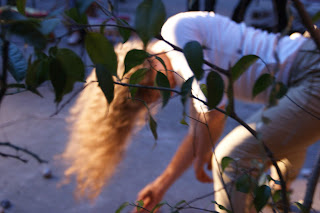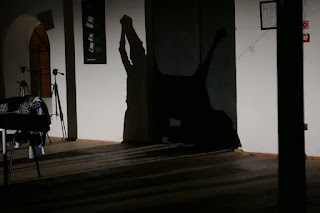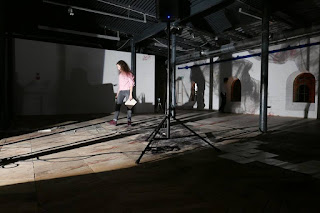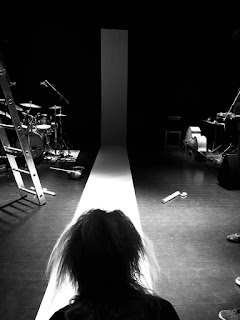niedziela, 22 września 2019
wtorek, 6 sierpnia 2019
poniedziałek, 8 lipca 2019
Human.Error, Soundance Festival, Berlin, 29.06.2019
Human.Error, Soundance Festival, Berlin, 29.06.2019
with Paulina Owczarek on baritone saxophone
and Lena Czerniawska Drawing
photo Christina Marx
with Paulina Owczarek on baritone saxophone
and Lena Czerniawska Drawing
photo Christina Marx
Human. Error.1
Error
has turned animals into men; might truth be capable of turning man
into an animal again?” Friedrich Nietzche, Human
all too Human
In the online poll on debate.org over
the question “Are humans the greatest mistake made by nature?”
53% of respondents said ‘Yes’, 47% voted ‘No’.
Popular science
media report that “‘500-Million-Year-Old
'Mistake' Led to Humans”.
In many myths of
creation, trickster – an undefinable cultural figure or force -
creates by mistake. “Trickster creates through destruction and
succeeds through failure .“ He “dabbles in the creation of the
world that will be and provides food, tools and clothing for the
people that will inhabit the world”. Trickster is also a powerful
transformer, but seems not to be aware of it. (Larry Ellis,Trickster:
Shaman of the Liminal)
In the moves of creating and
recreating and perfecting ourselves, our bodies, and the world we
are inevitably prone to lapses, unforeseeable consequences, gaps,
omissions, chance moves – that might all be categorized as
mistakes.
In
our piece we want to ask about the nature of mistake. Can we say for
certain that something is or was a mistake? Is a mistake a valid
category at all if we cannot see the wider picture and the far off
consequences? We want to play with the idea that if human race is a
result of a tiny genetic misstep, then who or what would human be if
500 million years ago something went differently ? Would we have
tails and claws? And amphibians would have their underwater cities
and croak programming language?
We
are conditioned to experience mistakes as something wrong, something
to be ashamed of, something that we expect punishment for, yet we are
utterly unable to foresee the consequences of our failures, and we
forget about the fact that they are crucial for learning. When
we make mistakes, we shrug and say that we are human. As bats are
batty
and slugs are sluggish, our own species is synonymous with screwing
up.
Kathryn
Schulz, Being
Wrong: Adventures in the Margin of Error
All erroneous ideas, all poisonous
weeds, all ghosts and monsters, must be subjected to criticism; in no
circumstance should they be allowed to spread unchecked.
Mao
Zedong, Speech at the Chinese Communist Party’s National Conference
on Propaganda Work (March 12, 1957), in The
Little Red Book,
1st pocket edition, pp. 26-27
Drawing:
Lena Czerniawska, Playing baritone saxophone: Paulina Owczarek,
Moving: Anna Bogdanowicz
sobota, 25 maja 2019
niedziela, 12 maja 2019
1,766.8035 Acres of Paradise etc - oldies from 2015
Found some oldies and thought of sharing them after all:
FreeVolous Improvisations was a cycle of improvised events combining sound, movement, text and any possible medium that came up on the way, in tricksterish, playful manner.
It happenned once a month in club spaces in Wrocław.
FreeVolous Improvs vol 2 featured
Thomas Kolarczyk on double bass and Anna Bogdanowicz moving.
Kolarczyk/Bogdanowicz Duo
FreeVolous Improvs vol 3, 05.03.2015, featured
Michał Biel on baritone saxophone and Anna Bogdanowicz moving
Biel/Bogdanowicz Duo
And another bit from FREEvolous Improvs no 8 in Sanatorium Kultury. 30.07.2015 with Michał Rupniewski on violin
Rupniewski/Bogdanowicz Duo
Another bit from our FREEvolous Improvs meeting on 30.07. 2015 in Sanatorium Kultury. This time Adam Webster and Anna Bogdanowicz in a duo that started off with a headline from a paper which would be in English "1,766.8035 Acres of Paradise". Enjoy!
1,766.8035 Acres of Paradise
FreeVolous Improvisations was a cycle of improvised events combining sound, movement, text and any possible medium that came up on the way, in tricksterish, playful manner.
It happenned once a month in club spaces in Wrocław.
FreeVolous Improvs vol 2 featured
Thomas Kolarczyk on double bass and Anna Bogdanowicz moving.
Kolarczyk/Bogdanowicz Duo
FreeVolous Improvs vol 3, 05.03.2015, featured
Michał Biel on baritone saxophone and Anna Bogdanowicz moving
Biel/Bogdanowicz Duo
And another bit from FREEvolous Improvs no 8 in Sanatorium Kultury. 30.07.2015 with Michał Rupniewski on violin
Rupniewski/Bogdanowicz Duo
Another bit from our FREEvolous Improvs meeting on 30.07. 2015 in Sanatorium Kultury. This time Adam Webster and Anna Bogdanowicz in a duo that started off with a headline from a paper which would be in English "1,766.8035 Acres of Paradise". Enjoy!
1,766.8035 Acres of Paradise
sobota, 27 kwietnia 2019
Human.Error - Soundance Festival. Berlin. 29.06.2019
graphics: Lena Czerniawska
By invitation of Jenny Haack, artictic director of Soundance Festival.
Drawing: Lena Czerniawska
Baritone Saxophone: Paulina Owczarek
Movement: Anna Bogdanowicz
By invitation of Jenny Haack, artictic director of Soundance Festival.
Drawing: Lena Czerniawska
Baritone Saxophone: Paulina Owczarek
Movement: Anna Bogdanowicz
Human. Error.
Error
has turned animals into men; might truth be capable of turning man
into an animal again?” Friedrich Nietzche, Human
all too Human
In the online poll on debate.org over
the question “Are humans the greatest mistake made by nature?”
53% of respondents said ‘Yes’, 47% voted ‘No’.
Popular science
media report that “‘500-Million-Year-Old
'Mistake' Led to Humans”.
In many myths of
creation, trickster – an undefinable cultural figure or force -
creates by mistake. “Trickster creates through destruction and
succeeds through failure .“ He “dabbles in the creation of the
world that will be and provides food, tools and clothing for the
people that will inhabit the world”. Trickster is also a powerful
transformer, but seems not to be aware of it. (Trickster:
Shaman of the Liminal, Larry Ellis [in: Studies
in American Indian Literatures, Series
2, Vol. 5, No. 4 (Winter 1993), pp. 55-68)
In the moves of creating and
recreating and perfecting ourselves, our bodies, and the world we
are inevitably prone to lapses, unforeseeable consequences, gaps,
omissions, chance moves – that might all be categorized as
mistakes.
In
our piece we want to ask about the nature of mistake. Can we say for
certain that something is or was a mistake? Is a mistake a valid
category at all if we cannot see the wider picture and the far off
consequences? We want to play with the idea that if human race is a
result of a tiny genetic misstep, then who or what would human be if
500 million years ago something went differently ? Would we have
tails and claws? And amphibians would have their underwater cities
and croak programming language?
We
are conditioned to experience mistakes as something wrong, something
to be ashamed of, something that we expect punishment for, yet we are
utterly unable to foresee the consequences of our failures, and we
forget about the fact that they are crucial for learning.
When
we make mistakes, we shrug and say that we are human. As bats are
batty and slugs are sluggish, our own species is synonymous with
screwing up.
Kathryn Schulz, Being
Wrong: Adventures in the Margin of Error
All erroneous ideas, all poisonous
weeds, all ghosts and monsters, must be subjected to criticism; in no
circumstance should they be allowed to spread unchecked.
Mao
Zedong, Speech at the Chinese Communist Party’s National Conference
on Propaganda Work (March 12, 1957), in The
Little Red Book,
1st pocket edition, pp. 26-27
Silent Duo in Macondo - Aeroplane #75. 24.05.2019
Aeroplane is a series of improvised gigs in Wroclaw club Macondo. Aeroplane#74: vocal concert by Ewa Żurakowska
Silent Duo: drawing - Lena Czerniawska, movement - Anna Bogdanowicz
poniedziałek, 14 stycznia 2019
DISQUIET at MUSICA PRIVATA, Łódź, 10.11.2018
The DISQUIET Crew at Musica Privata Festival inside the Factory of Arts in Łódź, 10.11.208
clip of Disquiet at Musica Privata 2018
photos by Agnieszka Jakuszak
clip of Disquiet at Musica Privata 2018
photos by Agnieszka Jakuszak
KIO at Ad Libitum Women Alarm!, Warsaw 25.10.2018
Making of with Charlotte Hug and the rest of the greatest KIO crew, photos by the wondrous Brianne Curran:
Subskrybuj:
Komentarze (Atom)













































